(10AM~ think of the bees! – promoted by RiaD)
I’ve sat down to write a followup of “The Green Desert” many times now. My apologies that my schedule has prevented me from devoting the proper time needed to organize my thoughts.
But a good thing has happened as a result of this delay – time has passed and our overgrown lawn is even more beautiful and/or unruly, depending on your point of view. Many many more flowers (and weeds) have bloomed. And most germane to the discussion, many many more honeybees have arrived.
Before I had mentioned that we had seen 3 or 4 bees, as many as we had seen from 2003 to 2007 combined. Now every day there are, I dunno, at least 50, maybe even more-it depends on the day and the time of day as well. But anyway, lots and lots of other types of insects too. Flies, butterflies & moths, lady bugs, and lots of just straight up bugs. (I hope they don’t get in the house 😉
Now 50 bees here is one thing, let me tell you what else has been going on.
We got a new puppy this April, and since then we have been on the Spanagel Diet. Or rather “Exercise Plan “. We take our dog (Spanagel) on long walks over our (my parents) farm 270 acres, 70 of it woods, adjoining many square miles of public wilderness.
Out of variety sake, we decided to explore literally every hollow, creek, woods, and field feasible. The last 3 months we have covered more territory than ever before, seeing things for the first time even though I grew up on this land. And in all of our walking, we rarely see a bee, and never around a field.
In case you did not read the first essay, the fields are industrial corn and soybean fields. “Roundup Ready” meaning they have been engineered to withstand Roundup, herbicide extrordinare. Not that I don’t think previous herbicides (and insecticides) didn’t do their job as well, but the Roundup-GM Crop combo is something quite different.
Back to the bees. The Queen Ann’s Lace, which dominates the areas around the fields, has some flies on it, but not a single bee. Queen Anne’s Lace is also the dominate flowering “weed” in our yard, and it seems to be the bees’ staple flower as well.
Now lets be clear and scientific (for a moment). I never made a point to look for bees before, and I walked around “out in the data” on the order of one-quarter or less than I do now. But I stand by my observations, and the conclusions that would seem obvious from this line of talk.
It was mentioned in the comments of the last essay, that Roundup was a herbicide, not an insecticide, and wouldn’t affect the bees. Now one comment does not movement make, but it seems to me that many have lost sight of a basic concept: Everything is connected.
You cannot compartmentalize “herbicide” away from the rest of nature, and certainly not from something so nearly identical as “insecticide” Its not on a different channel. And neither is “water supply”, “air”, “mammal”, “gonad”, or anything else on this planet.
I’d like to make a couple more observations. I think is prevalent in our society today, and, perhaps surprisingly to some, found in equal values on both the left and right of the political spectrum, that people have no idea of the realities of farm life/history of farm life/the weather/and the truth of when you “hit the gound” (literally).
Now this lack of wisdom takes generally different forms on each side of the spectrum, but the outcome is the same–poor ideas, idiotic decisions, bad outcomes.
On top of all this, we are involved, perhaps too heavily, with our local zoning board. I recently questioned a part of our code that prohibited growing crops over septic fields. Someone replied (paraphrasing) “…but we don’t want food grown over poop, there’ll be disease problems…” I replied that poop was natural fertilizer and a proper outcome for waste disposal. (Our tomatoes over our septic field are the best ones we have, BTW) I received a scrunched forehead and a quizzical look from the other person. I am shamed to say this person was a “progressive”. Have you all seen “Idiocracy” by Mike Judge? Makes me think I’m in that movie already. My wife quite often says now, “Oh my god, its that movie…”
You might say that the answer is so simple. But its not. For all of my assertions as to others’ lack of wisdom, I must say that I am an idiot, because if society crumbled today, I would be hard pressed to survive, even though I live on hundreds of acres of tillable land, that my anscestors survived on using 19th and 20th century technology, and Native Ameicans survived on for milennia before that.
My father is 86 and still farms the land doing (at least) 90 percent of the work including planting, harvesting, repairing, maintaining, heavy lifting, etc. Manual labor, at a level than most people 40 years younger. No interest in retiring. No interest in “developing” his land (for what could turn out to be a few million dollars), even though we suffer through frequent accusations that we are motivations are to “divide up farmland. We have 200 tillable acres, which only pays because we haven’t “recapitalized” (buy new equipment) in many years. The combine is a 1979, the main tractor is a 1982, and so forth. For what its worth, Purdue University, the state’s Ag School, calculates you need to farm 1500 acres just to break even.
Even at 200 acres, one man now farms what used (pre 1970) to be three family farms. The good news is that because of that, you, and especially I, have been allowed to go on and have the rest of our lives, concerned with important jobs like web development, virtual reality, or the next big movie. Food is something you get at restaurant, or the grocery store. We get it effortlessly, allowing our minds to think lofty philosophical or religious thoughts of how the world should be.
My wife and I have watched, aghast, as my father has cut the woods back away from the field. I came home one day early in our time back here, “I killed 500 baby trees today,” when he had me do similar work. I’ve seen, that the crops do grow better, by a large margin, when the woods is cut back. And we’ve watched, in amazement, as the cutting only makes the trees grow back quicker, and they are back to be cut again, sometimes just one season later.
Which brings me to the observation that humans GREATLY understimate nature. We have a three year old maple tree in our yard that we rescued out of a field about to be plowed. It is approaching 20 feet tall (I shit you not.) Now there’s a bunch of other trees that haven’t grown that much, but WTF.
Now I’m not saying that Roundup is OK, but going the other way completely is not the answer either. My father lived in the time before herbides. He had standing orders that when he did not have any other jobs to do, he was to take a hoe and go out into the field. The farm was then about 80 acres. Have any of you even hoed a quarter acre garden? It sucks. Especially in July and August, but guess what, that’s when the “weeds” grow the best. My father has said that when 2-4-D (1950s herbicide) came out it was like a miracle.
And then there’s insects. Pestulence eating your crops, either in the field, or in the bin. Don’t want to eat flour with bugs in it? Tough shit-or starve. Anyway, its better than the other family who didn’t have any wheat harvest at all. What’s more, there was disease. Why did people cut down their grass and make that generic lawn I have lambasted now in two essays? Because someone lost a kid (more like half the town lost a kid) from disease from insects. (Up until 1915, you had a 50-50 chance of living past age 10).
So what’s the answer to all this? Right now I’m inclined to say:
Defy your local zoning board and stop mowing your lawn; don’t spray any poisons on it
Practice sound methods of hygiene (the true reason for the disease, usually not the insect)
Plant a garden, no matter how small; even if it’s just on your window sill
Learn about your food; teach your children where food comes from
Avoid sweeping statements like “Farmers just want to ______”
Fight the copyrighting and trademarking of seeds (a trick of the genetically-modified crop corporations).
Give careful some thought and meditation on the subject of balance and success in food production for a modern, diversified society, and how to achieve a pleasant future for the residents of the planet Earth.
I’d like to thank everyone for putting me up on the front page on my previous post. It was a nice welcome. I was drawn to here from the unique diaries and pictures by buddydharma on that other site, and thought here would be a good place to post. Click on the mandala pictures for a high-res version of them. They are public domain.–bt


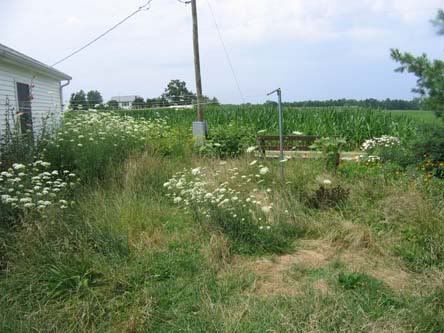
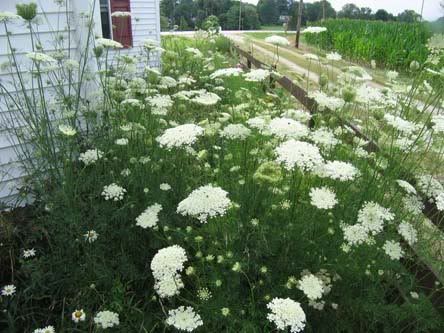
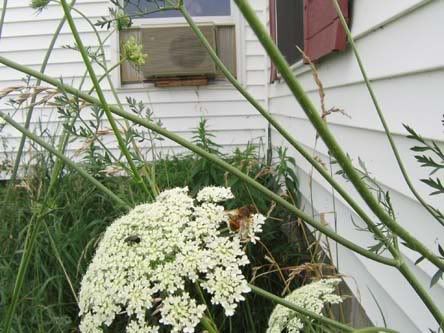
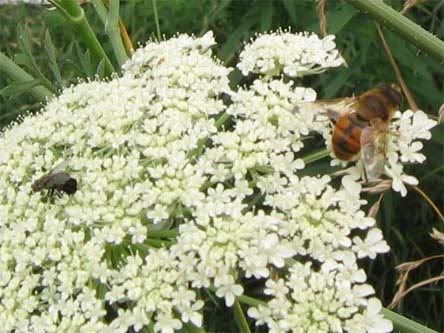
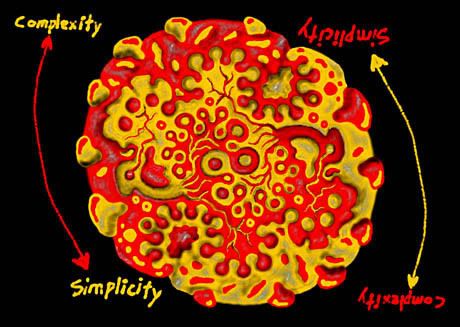
4 comments
Skip to comment form
Author
And you might even consider planting some Asclepias tuberosa (milkweed) in among the Queen Anne’s lace–Monarch butterfly caterpillars require it as food.
As far as bugs are concerned: I don’t know where you are, but I avoided pesticides (it was a pretty small border garden with some second-growth woods nearby) and I quickly had all the wheelbugs and (the second year) praying mantises I needed to keep the Japanese beetle population down. Since most of my plants were perennials, I just hacked them low when a plant had a major infestation of mites.
Your yard looks great to me. (Except I keep thinking: chiggers! But that’s just me….)
when someone sprays herbicide near me, namely roundup, my lips tingle and my tongue goes numb. It can’t be good for people or bees. The lawn is beautiful. Tipped and rec’d. Keep those bees swarming!
Very enjoyable, informative and interesting!
Queen Anne’s lace is really very beautiful, but it is very invasive and does tend to “take over.”
Myself, I have never been one for chemicals, but I did use fertizler and weed-killer about once a year on my lawn. This year, I am going completely organic, utilizing all organic products. Of course, the lawn is not looking very good right now — it takes time and it has rained so much that fighting the weeds has been/is a big struggle.
Little by little, bit by bit!!!!